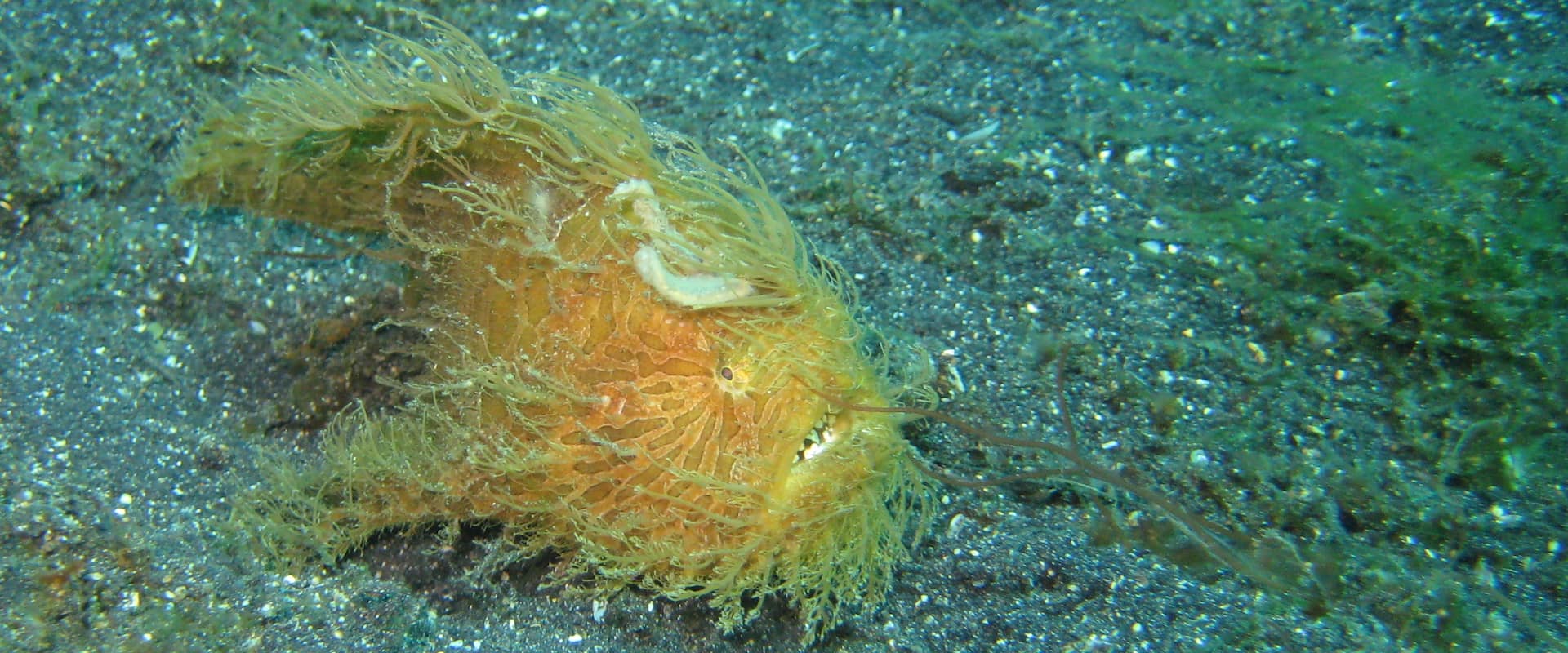Liveaboard Diving in Lembeh Strait
What to Expect On a Lembeh Strait Liveaboard
Lembeh Strait liveaboards will take divers to a fairly remote region in Northern Sulawesi, Indonesia. But the reward is great, as Lembeh is revered amongst muck divers as the holy grail of critter hunting. Lembeh Strait is the narrow stretch of water between Bitung and Lembeh Island, and it has earned the reputation as the 'Muck diving capital of the world' and certainly lives up to it. This area has created a macro photographer's paradise, where some of the most elusive and ornate species of fish and coral reside. Not only this, but the black sands found on most dive sites also help to reduce back glare and give stunning contrast against the vividly colored inhabitants.
The nearest major shops are found in Bitung to the south. However, what it lacks in amenities is more than made up for by dive site quality, and you won't be lacking for anything while cruising along in your luxury liveaboard around the outstanding sites of Lembeh Strait.
Lembeh Strait Underwater
Although it is known as a stretch of water for seeing all the wonderfully colored small creatures, that's not to say some of the largest won't visit you. Whale sharks, the largest known species of extant fish, and the incredibly endangered dugong have also been known to accompany divers.
Lembeh Strait liveaboard cruises offer divers a choice of over 60 dive sites. Some of the most desired species can be found here for photographers and anyone who appreciates little creatures. A dive trip on a liveaboard in the Strait allows for the most prolific sites to be easily visited, away from the traffic of daily-visited sites. It is not uncommon for completely new species to be discovered, owing to how much we still donít know about our underwater world and how much there still is to discover. Some of these sought-after species include the pygmy seahorse, ghost pipefish, mantis shrimps (a shrimp so powerful it boils the water around its fists when striking prey), the deadly poisonous, iridescent blue-ringed octopus, and several species of frogfish.
Diving in Lembeh Strait can be achieved yearly on selected Indonesian liveaboards. Its tropical climate keeps water temperatures between 77 to 84 Fahrenheit (25 to 29ºC). Even so, full wetsuits are usually worn to ensure protection from the corals that can be very sharp and hard to spot. Most Lembeh dive sites are shallow, less than 26 feet (8 m), and visibility is usually very good at around 65 feet (20 m). However, this can sometimes drop to as low as 13 feet (4 m) after heavy rains. The wet season is from November until February, where fairly substantial rain can fall for several days. This is not usually a problem, though, and does little to detract from the beauty of the sites.
Dive Sites of Lembeh Strait
Liveaboards will visit many of the most popular dive sites in this area, but a few to consider would be;
Mawali Wreck is a Japanese World War II cargo ship that now lies on its starboard side in 50 to 100 feet (15 to 30 m) of water. The vessel is completely encrusted with soft corals throughout its 200-foot (60 m) length. Crinoids gently wave back and forth along the shipís side, and black coral trees are dotted all over, especially along the upward-facing port side. The wreck has become the home of enormous scorpionfish and lionfish, and barramundis (Asian sea bass) swim here in great numbers.
Angel's Window provides a change of scenery, being one of only a few sites in the Lembeh Strait that is not a muck diving site. Angel's Window gets its name from a large, highly decorated swim-through found at a depth of 75 feet (23 m). The walls of the cavern zone are lined with very delicate, soft corals and provide excellent shelter for a wealth of species. Pink pygmy seahorses, octopus, batfish, and nudibranchs can all be found here.
Hairball is a typical muck diving site with gentle, black-sand slopes, sunken logs, and abundant patches of macro life. There are loads of frogfish, white, black, yellow, giant, and hairy. Mimic octopus using coconut shells for camouflage can also be seen.
Top Tips for Divers
Visibility can fall to around 14 feet (4 m) following heavy rain, so it becomes even more important to maintain good buddy contact while diving. Roughly the combined distance of your arm and your buddy's arm is considered the safest distance apart.
A good-quality torch is an excellent addition to your kit if you don't already have one. Even when you're not night diving, a torch can help display the true colors of all the species you'll find, significantly if visibility drops.
Getting to Lembeh Strait
Manado International Airport is the nearest airport to your liveaboard boat in Lembeh Strait, roughly 1.5 hours away from Bitung Port. Direct international flights are daily, but many people catch connecting flights via Singapore. Once in Manado, getting a taxi or renting a car is possible, although many liveaboards can arrange a pick-up service on your behalf.
Lembeh Strait Diving Reviews
- 9.1 Superb
- 8.0 Very good
- Steven W
United States
The strait is great for macro and incredibly variety. You are often diving in garbage, but the rewards can be spectacular.
Diving Lembeh Strait in February on the Sunshine
- 9.6 Exceptional
- Samira S
Switzerland
A lot of strange creatures under water
Diving Lembeh Strait in May on the Ambai
- 9.6 Exceptional
- Elaine M
Switzerland
OK. We've been to Lembeh before and although we saw quite a lot, have the feeling that diving from a resort rather from a liveaboard brings more, in that resort guides know the location of almost every single critter, which liveaboard guides cannot.
Diving Lembeh Strait in February on the Mermaid I











